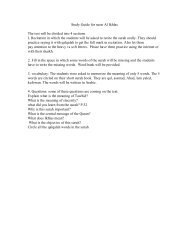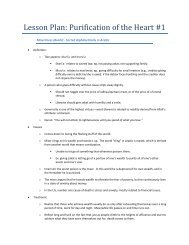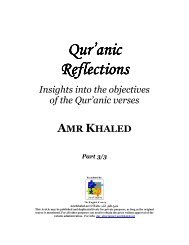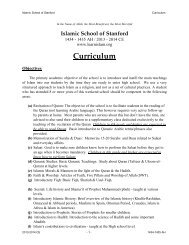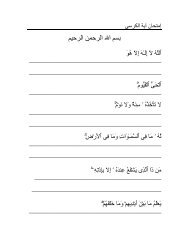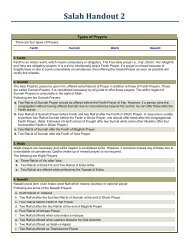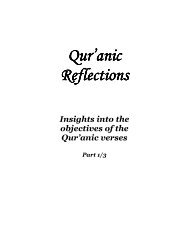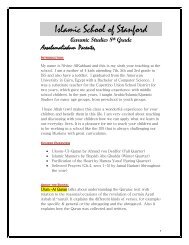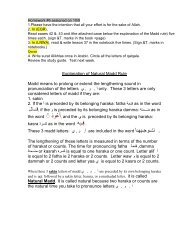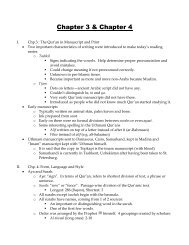Quranic Reflections - Islamic School of Stanford
Quranic Reflections - Islamic School of Stanford
Quranic Reflections - Islamic School of Stanford
Create successful ePaper yourself
Turn your PDF publications into a flip-book with our unique Google optimized e-Paper software.
permission. That is Allah, your Lord; so worship Him. Will you then not be<br />
mindful” (TMQ, 10:2).<br />
“…Conducting the Command” recurs all through the surah emphasizing Allah’s<br />
wisdom and great organization. Again, frivolity is never consistent with Allah’s<br />
immense wisdom. It is illogical, therefore, that He would unjustly force people to sin<br />
in order to meet his own plans; his predestination <strong>of</strong> them to be <strong>of</strong> the dwellers <strong>of</strong> hell.<br />
Truth is its title<br />
In the next ayah in which Allah (SWT) says what can be translated as, “To Him will<br />
be your return altogether, the promise <strong>of</strong> Allah, truly (binding)...” (TMQ, 10:4),<br />
“truly” or truth, is the opposite <strong>of</strong> coincidence and futility. That is why it is repeated<br />
in this surah, whose subject-matter is belief in fate and destiny, 23 times; the highest<br />
number <strong>of</strong> occurrences in the Qur’an. The word occurs 23 times in a Surah <strong>of</strong> 109<br />
ayahs. In Surat Al-‘Imran, the 200-ayah-long surah, the same word occurs 13 times<br />
only. A huge difference indeed! The repetitions are in proportion to Surat Yunus’<br />
main focus; submission to Allah’s fate and destiny. Anybody who is suspicious <strong>of</strong><br />
this should speculate upon Allah’s creation and impeccable administration <strong>of</strong> the<br />
universe.<br />
The previous ayah goes on to clearly state that punishment is a direct result <strong>of</strong><br />
blasphemy, in what Allah (SWT) says and can be translated as, “To Him will be your<br />
return altogether, the promise <strong>of</strong> Allah, truly (binding). Surely He begins the<br />
creation; thereafter He brings it back again to recompense the ones who have<br />
believed and done deeds <strong>of</strong> righteousness with equity. And the ones who have<br />
disbelieved will have a drink <strong>of</strong> scalding water and a painful torment for that<br />
they have been disbelieving.” (TMQ, 10:4).<br />
In no way has Allah created that except with the truth<br />
The next ayah draws our attention to Allah’s creation and management <strong>of</strong> the<br />
universe. Allah (SWT) says what can be translated as, “He is The (One) Who has<br />
made the sun an illumination, and the moon a light and determined it by phases<br />
that you may know the number <strong>of</strong> years and the reckoning. In no way has Allah<br />
created that except with the truth. He expounds the signs for a people who know.<br />
Surely, in the alternation (Or: the differences) <strong>of</strong> the night and the daytime and<br />
whatever Allah has created in the heavens and the earth, are indeed signs for a<br />
people who are pious...” (TMQ, 10:5-6). The previous ayah tempts us to<br />
contemplate on Allah’s alteration <strong>of</strong> day and night. Only Allah (SWT) is capable <strong>of</strong><br />
such flawless management. The one who manages all these affairs is far from being<br />
frivolous, and He would never force people into hellfire unreasonably.<br />
Who poses such questions<br />
Ayah seven specifies which types <strong>of</strong> people hold such invalid beliefs. Allah (SWT)<br />
says what can be translated as, “Surely the ones who do not hope for the meeting<br />
with Us and are satisfied with the present life, (Literally: the lowly life, i.e., the<br />
life <strong>of</strong> this world) and feel composed with it, and the ones who are heedless <strong>of</strong>



